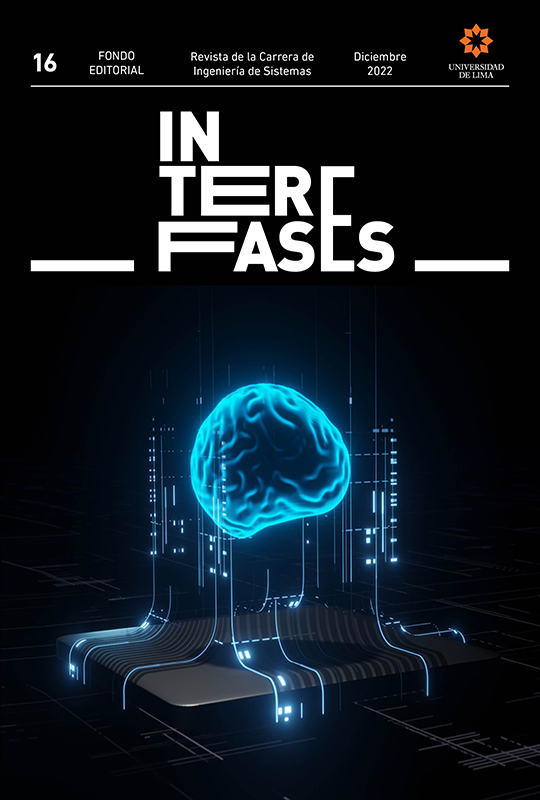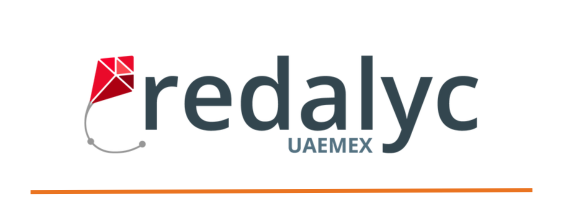Retos y oportunidades en la accesibilidad de datos
DOI:
https://doi.org/10.26439/interfases2022.n016.5888Palabras clave:
accesiblidad, datos, salud, protección, éticaResumen
En el área de la salud, existe una gran variedad y cantidad de información sensible y valiosa que no es explotada en su totalidad en beneficio de las personas, debido a la falta de acceso a los datos. Varios factores influyen en la accesibilidad de los datos en organizaciones privadas o públicas, y para determinarlos se ha hecho una revisión bibliográfica; de los 300 artículos consultados, 23 se incluyeron en esta revisión. Entre los factores resultantes que influyen en la accesibilidad de la información, destacan gobiernos abiertos, sistemas de información de salud, leyes de protección de datos personales, ética en el uso de la información médica y lagos de datos. Facilitar la accesibilidad a los datos de salud traería una mejora de servicios y planes de tratamiento, ahorro de recursos económicos estatales, e impulsaría la educación y la investigación.En el área de la salud, existe una gran variedad y cantidad de información sensible y valiosa que no es explotada en su totalidad en beneficio de las personas, debido a la falta de acceso a los datos. Varios factores influyen en la accesibilidad de los datos en organizaciones privadas o públicas, y para determinarlos se ha hecho una revisión bibliográfica; de los 300 artículos consultados, 23 se incluyeron en esta revisión. Entre los factores resultantes que influyen en la accesibilidad de la información, destacan gobiernos abiertos, sistemas de información de salud, leyes de protección de datos personales, ética en el uso de la información médica y lagos de datos. Facilitar la accesibilidad a los datos de salud traería una mejora de servicios y planes de tratamiento, ahorro de recursos económicos estatales, e impulsaría la educación y la investigación.
Descargas
Referencias
Alsahafi, Y. A., Gay, V., & Khwaji, A. A. (2022). Factors affecting the acceptance of integrated electronic personal health records in Saudi Arabia: The impact of e-health literacy. Health Information Management Journal, 51(2), 98-109. https://doi.org/10.1177/1833358320964899
Avila-Garzon, C. (2020). Applications, methodologies, and technologies for linked open data: A systematic literature review. International Journal on Semantic Web and Information Systems, 16(3), 53-68. https://doi.org/10.4018/IJSWIS.2020070104
Bauer, D., Froese, F., Garcés-Erice, L., Giblin, C., Labbi, A., Nagy, Z. A., Pardon, N., Rooney, S., Urbanetz, P., Vetsch, P., & Wespi, A. (2021). Building and operating a large-scale enterprise data analytics platform. Big Data Research, 23. https://doi.org/10.1016/j.bdr.2020.100181
Boudreau LeBlanc, A., Williams-Jones, B., & Aenishaenslin, C. (2022). Bio-ethics and One Health: A case study approach to building reflexive governance. Frontiers in Public Health, 10. https://doi.org/10.3389/fpubh.2022.648593
Buhr, L., Schicktanz, S., & Nordmeyer, E. (2022). Attitudes toward mobile apps for pandemic research among smartphone users in Germany: National survey. JMIR MHealth and UHealth, 10(1). https://doi.org/10.2196/31857
Calva, M., & Piedra, N. (2020). Cycle of transformation of open and linked medical data to improve the training of health professionals. En Proceedings of the 15th Latin American Conference on Learning Technologies (LACLO) (pp. 1-10). https://doi.org/10.1109/LACLO50806.2020.9381158
Cohen, G., Gerke, S., & Kramer, D. B. (2020). Ethical and legal implications of remote monitoring of medical devices. The Milbank Quarterly, 98(4), 1257-1289.
Comandè, G., & Schneider, G. (2021). Can the GDPR make data flow for research easier? Yes it can, by differentiating! A careful reading of the GDPR shows how EU data protection law leaves open some significant flexibilities for data protection-sound research activities. Computer Law & Security Review, 41. https://doi.org/10.1016/j.clsr.2021.105539
Dunbar, E., Olsen, H. E., Salomon, E., Bhatt, S., Mutuku, R., Wasunna, B., Edwards, J., Kolko, B., & Holeman, I. (2021). Towards Responsible Data Practices in Digital Health: A case study of an open source community’s journey. En Extended Abstracts of the 2021 CHI Conference on Human Factors in Computing Systems (CHI EA ‘21) (artículo 42, pp. 1-8). Association for Computing Machinery. https://doi.org/10.1145/3411763.3443438
Eder, J., & Shekhovtsov, V. A. (2021). Data quality for federated medical data lakes. International Journal of Web Information Systems, 17(5), 407-426. https://doi.org/10.1108/IJWIS-03-2021-0026
Galeone, C., & Bonzi, R. (2020). Open data: Applications in social care and health. Statistica Applicata - Italian Journal of Applied Statistics, 32(2), 125-139. https://doi.org/10.26398/IJAS.0032-008
Gefenas, E., Lekstutiene, J., Lukaseviciene, V., Hartlev, M., Mourby, M., & Cathaoir, K. (2022). Controversies between regulations of research ethics and protection of personal data: Informed consent at a cross-road. Medicine, Health Care and Philosophy, 25(1), 23-30. https://doi.org/10.1007/s11019-021-10060-1
Healthcare Information and Management Systems Society. (2021). 2021 HIMSS Healthcare Cybersecurity Survey. https://www.himss.org/resources/himss-healthcare-cybersecurity-survey
Jones, K. H., Ford, E. M., Lea, N., Griffiths, L. J., Hassan, L., Heys, S., Squires, E., & Nenadic, G. (2020). Toward the development of data governance standards for using clinical free-text data in health research: Position paper. Journal of Medical Internet Research, 22(6). https://doi.org/10.2196/16760
Kandasamy, K., Srinivas, S., Achuthan, K., & Rangan, V. P. (2022). Digital healthcare - cyberattacks in Asian organizations: An analysis of vulnerabilities, risks, NIST perspectives, and recommendations. IEEE Access, 10, 12345-12364. https://doi.org/10.1109/ACCESS.2022.3145372
Keefer, P., & Scartascini, C. (2022). Confianza: la clave de la cohesión social y el crecimiento en América Latina y el Caribe. Banco Interamericano de Desarollo. http://dx.doi.org/10.18235/0003911
Laurent, A., Laurent D., & Madera, C. (2020). Data Lakes. John Wiley & Sons.
Open Data Charter. (2015). Carta Internacional de Datos Abiertos. https://opendatacharter.net/principles-es/
Pierce, R., & Evram, M. (2022). Getting it right: Implementing data protection in citizen science research. Insights: The UKSG Journal, 35. https://doi.org/10.1629/UKSG.538
Red Iberoamericana de Protección de Datos. (2019). Recomendaciones generales para el tratamiento de datos en la inteligencia artificial. https://www.redipd.org/sites/default/files/2020-02/guia-recomendaciones-generales-tratamiento-datos-ia.pdf
Rooney, S., Bauer, D., Garcés-Erice, L., Urbanetz, P., Froese, F., & Tomic, S. (2019). Experiences with managing data ingestion into a corporate datalake. En Proceedings - 2019 IEEE 5th International Conference on Collaboration and Internet Computing (CIC) (pp. 101-109). https://doi.org/10.1109/CIC48465.2019.00021
Shah, S. M., & Khan, R. A. (2020). Secondary use of electronic health record: Opportunities and challenges. IEEE Access, 8, 136947-136965. https://doi.org/10.1109/ACCESS.2020.3011099
The National Commission for the Protection of Human Subjects of Biomedical and Behavioral Research. (1979). The Belmont Report. Ethical principles and guidelines for the protection of human subjects of research. https://www.hhs.gov/ohrp/regulations-and-policy/belmont-report/read-the-belmont-report/index.html
Publicado
Número
Sección
Licencia
Los autores/as que publiquen en esta revista aceptan las siguientes condiciones:
Los autores/as conservan los derechos de autor y ceden a la revista el derecho de la primera publicación, con el trabajo registrado con la licencia de atribución de Creative Commons, que permite a terceros utilizar lo publicado siempre que mencionen la autoría del trabajo y a la primera publicación en esta revista.
Los autores/as pueden realizar otros acuerdos contractuales independientes y adicionales para la distribución no exclusiva de la versión del artículo publicado en esta revista (p. ej., incluirlo en un repositorio institucional o publicarlo en un libro) siempre que indiquen claramente que el trabajo se publicó por primera vez en esta revista.
Se permite y recomienda a los autores/as a publicar su trabajo en Internet (por ejemplo en páginas institucionales o personales) antes y durante el proceso de revisión y publicación, ya que puede conducir a intercambios productivos y a una mayor y más rápida difusión del trabajo publicado (vea The Effect of Open Access).
Última actualización: 03/05/21






